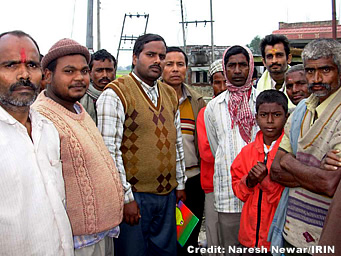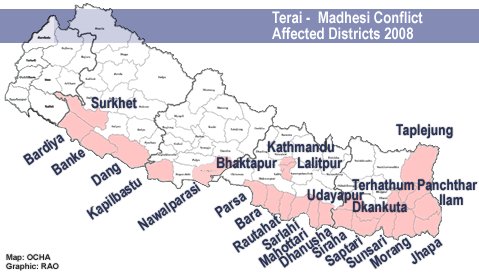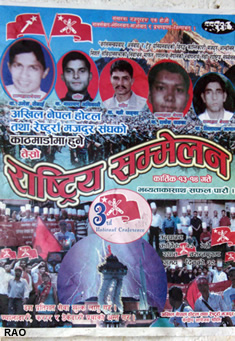|
Nepal
2008: Facts on the Conflict
|
|
Nepal
Situation Overview :Covering period of 25 June - 11 July 2008
|
 |
The
ruling Seven Party Alliance (SPA) reached a new agreement on 25 June over
contentious political issues that were delaying the Constituent Assembly
(CA) from drafting a new constitution and forming a new government. The
parties agreed to a 21-Point bill, which among other crucial issues included
the Fifth Amendment of the interim constitution to elect president, vice-president
and Prime Minister through a simple majority.
 |
| On
26 June, Prime Minister Girija Prasad Koirala announced his resignation,
calling for the formation of a new government under the leadership of Communist
Party of Nepal-Maoist (CPN-M). PM Koirala will continue to act as caretaker
PM until he officially tenders his resignation to the new president.
The
political stalemate continued after the parliamentary session of the CA
was postponed for the twelfth consecutive day since 26 June, following
protests by parliamentarians of the Madhesi parties
against the SPA's failure to include their demands in the Fifth constitutional
Amendment. |
|
The
Madhesi Janadhikar Forum (MJF), Terai-Madhesh Democratic Party (TMDP),
Federal Republic Front (FRF) and Rajendra Mahato-led Nepal Sadbhawan Party
(NSP) staged regular demonstrations inside the Assembly stalling the legislative
proceedings. The contention was that demands for an autonomous Madhesh
Province in the Terai and proportionate representation of Madhesi in the
Nepal Army were agreed by the SPA with the umbrella of Madhesi parties
(United Madhesi Democratic Front -UDMF) during an agreement in February
2008.
To
end the political deadlock, a constitutional supplementary bill was drafted
on 4 July after nearly a week of protracted negotiations to address the
demands of the Madhesi parties, but SPA could not table the bill during
the CA's scheduled session on 5 July following the rejection by the Madhesi
parties.
The
CA resumed its parliamentary session on 8 July after agreeing to introduce
a newly drafted second supplementary bill, which was tabled on 9 July.
The parliamentarians representing the Madhesi parties rejected the bill
and boycotted the legislative session.
On
13 July, the CA passed the Fifth Amendment with the new supplementary bill
despite lack of consensus from Madhesi parties.
It allows the election of president and vice-president and formation of
new government through simple majority of the CA. The constitutional
supplementary amendment stated that there would not be a single province
but multiple autonomous states, such as the Terai-Madhesh for the Madhesi
and other indigenous and ethnic groups. The names, numbers and structures,
including details of centre and provinces, resources and allocation of
resources would be determined by the CA. Entry into the Nepal Army will
be based upon the principle of equality and inclusion.
Kathmandu,
12 July 2008
Protests
against the 'one Mahesh one province' were staged by various non-Madhesi
indigenous groups and led by Tharu Kalkarini Sabha (TKS) and Chure Bhawar
Ekata Party (CBEP). On 28 June, CBEP warned that residents of the Chure
Bhawar region would take up arms if the SPA agreed to the Madhesi demands.
The Tharu Welfare Assembly organised a series of protest programmes in
the capital and Terai condemning SPA's action to introduce the new supplementary
bill. Around 16 organisations, including Nepal Federation of Indigenous
Nationalities (NFIN), CPN (Marxist Leninist) and Chure Bhawar Ekta Party
announced their support to the Tharu agitation against the Madhesi province.
On
8 July, Tharu groups, including TWC, Tharu Student Society, Tharu Youth
Front and Tharuhat Autonomous State Council, formed a new Tharuhat Joint
Struggle Committee to intensify protests. The TWC organized a Terai Bandh
on 10 July against the demand for a 'One Madhesh one province'. The Bandh
was strictly observed in the Districts of Kailali and Kanchanpur where
the Tharu formed the ethnic majority, with no vehicular movement and the
markets were mainly closed. On 4 July, Federal Republican National Front
(FRNF), CBEP and Nepal Loktantrik Samajwadi Dal jointly organised a general
strike in the Terai region obstructing public transport and private vehicles
on the East-West Highway. The strike mostly affected the eastern districts
of Rautahat, Sarlahi, Saptari, Siraha, Mohattari, Dhanusha and Morang,
and also Bara and Parsa in the Central Region.
There
are serious political concerns in the Eastern Region over the emerging
trend of ethnic and indigenous groups declaring autonomous provinces. The
Federal Limbuwan State Council (FLSC) has claimed the region's three districts
(Morang, Jhapa and Sunsari) as 'Limbuwan State' while the CPN-Maoists and
Dhimal caste have declared the region as 'Kochila' and 'Dhimal autonomous
state'. An alliance of nine indigenous groups- comprising of Rajbansi,
Gangain, Meche, Dhimal, Sathal and Urao among others-known as Eastern Terai
Indigenous Janjati Organisation (TIJO) named the region as 'Morang Autonomous
State'. The trend of declaring group associated States threatens the social
structure of Nepal, which has prompted calls from sociologists for the
State Restructure Commission to address this matter cautiously.
After
nearly three months since the CA elections, the cabinet nominated the remaining
26 CA members making the 601-member Assembly complete. Out of the 26 members,
15 are from indigenous nationalities and six from marginal ethnic groups.
During the reporting period, major parties had started their internal discussions
for preparation to form a new government.
The
Government of Nepal reportedly handed a formal letter to the UN Secretary
General to extend term of UN Mission in Nepal (UNMIN) for another six months.
UNMIN officially closed its regional offices in the Mid-West and Far-West
Regions on 10 July.
The
indefinite strike called by the Nepal Petroleum Dealers Association (NPDA)
was withdrawn on 30 June after nearly a week of protests following intervention
by Federation of Nepalese Chamber of Commerce and Industry (FNCCI) and.
The dealers have planned another protest immediately after a new government
is formed. The strike caused an acute shortage of petroleum products following
the closure of 2,500 dealers despite the recent 25 per cent price increase.
 |
| The
security situation is deteriorating in the Terai, in particular in the
Eastern and Central Regions, where armed groups are increasingly active
in the absence of government structures.
In
Madhuwapur VDC of Siraha District, an engineer from Kathmandu was abducted
by an unknown group on 27 June. Another civilian was abducted on 30 June
in Basbitti VDC of the same District, no group has claimed responsibility. |
|
On
2 July, an armed group opened fire at Dhulabari of Mechinagar Municipality
in Jhapa District and killed a businessman and injured several others.
On 4 July, members of Janatantrik Terai Mukti Morcha (JTMM) led by Rajan
Mukti shot one of two businessmen abducted from Jaleswor-Bardibas in Mahottari.
An unidentified group attacked a human rights activist on 6 July at Batahakhola
of Dhodhana VDC in Siraha. A YCL cadre was killed by an unidentified gang
following his abduction in the District's Mirchaya VDC. In Sunsari, local
farmers vandalized a YCL office at Inaruwa protesting against the capture
of fertilizer by CPN-Maoists. They also staged a demonstration on the main
highway and local markets were closed at Inaruwa.
 |
| In
another incident, Jwala Singh led JTMM (JTMM-JS) cadres shot dead a civil
society member and the former Mayor of Gulariya municipality of Bardiya
where he was working as District Coordinator of the Civil Society Network
on 29 June. Following the killing, the Federation of Nepalese Chamber of
Commerce and Industry (FNCCI)-Bardiya chapter called for Bandh in Gulariya
Bazaar. |
|
Government
offices and employees, including those working with police forces, are
becoming political targets for political and civilian groups. Cadres of
Kirant Jawadi Workers Party (KJWP), whose armed activities increased in
the eastern hilly districts of Bhojpur and Khotang, looted the police posts
and set fire to a VDC office. In Khotang, the VDC secretaries appealed
for security from the local administration following threats from activists
of KJWP. The activists threatened VDC Secretary's to donate NPR 200,000
and resign within the month.
VDC
Secretaries of the Chisapani, Bopung, Devisthan, Diplung, and Dambrakhu
Siwalaya VDCs' were among those displaced from their working stations.
Due to regular threats, the VDC Secretaries are not releasing the VDC budget
from the District Development Committees (DDC). Once the VDC Secretary
releases the budget, they face problems from armed groups demanding donations
and from local parities pushing preference for projects in VDCs. Protesting
the attack on District Development Committee (DDC) Saptari, the staff of
local bodies stopped work for an indefinite period. The staff said they
would not return to work until the government assures them security and
punishes the guilty. Civil servants shut down all local bodies in the district.
The field presence of government staff working with local bodies was drastically
reduced due to insecurity. For instance, 30 VDC Secretaries in Jajarkot
District are operating from District Headquarters (DHQ). Local people,
particularly in Daha, Kortang, Maikot, Thalaraikar and Suwanauli VDCs,
are compelled to travel at least three days to access the VDC Office services.
On
1 July, a group of NC activists assaulted the VDC Secretary of Laxmipur
Prama VDC of Siraha. The VDC Secretary Welfare Promotion Forum (VDCSWPF)
has locked up the offices of DDC, demanding immediate action against the
NC activists. Employees of Siraha VDC and DDC submitted a joint resignation
to Ministry for Local Development (MOLD) demanding their security.
Concerned
over the state of lawlessness and growing insecurity in Morang, the Maoist-affiliated
The Nepal Federation of Trade Unions (ANFTU) demanded District Administration
Office in Biratnagar for the effective security arrangement to prevent
growing number of abduction in the region. In Siraha, members of the ruling
party Nepali Congress (NC) organized called a general strike on 7 July
protesting against lack of action by the district administration towards
controlling the increasing criminal activities.
From
5-8 July, flights from/to Nepalgunj were cancelled due to the protests
by the Karnali Rights Coordination Committee (KRCC) and passengers to the
Karnali demanding additional flights to the Karnali Zone, protesting airfare
hikes and demanding discounts of 55 per cent for students and 50 per cent
for children below 12 years old, among others. Irate passengers padlocked
the main entrance gate of the Ranjha Airport and the counter of the airlines
at the airport. Similar protests were organized in Surkhet and Humla airports
three weeks ago by the KRCC, which formed two weeks before the CA election.
Following a meeting of the Ministry of the Civil Aviation and CA members
from the Karnali, the airport was re-operational from 8 July.
Source:OCHA
2008
Copyright
© UN Office for the Coordination of Humanitarian Affairs OCHA 2008
[
This report does not necessarily reflect the views of the United Nations]
| Madhesi
factbox |
 |
 |
 Nepal's
largest
ethnic group; make up about one third of Nepal's 27 million people Nepal's
largest
ethnic group; make up about one third of Nepal's 27 million people
 Concentrated
in the lowland Terai region, southern Nepal, the country's industrial and
agricultural heartland Concentrated
in the lowland Terai region, southern Nepal, the country's industrial and
agricultural heartland
 Traditionally,
their main ethnic rivals are the politically dominant hill people known
as Pahades Traditionally,
their main ethnic rivals are the politically dominant hill people known
as Pahades
 Comprised
of various sub-groups with several different languages and dialects and
have only recently developed a political consciousness and unity of purpose Comprised
of various sub-groups with several different languages and dialects and
have only recently developed a political consciousness and unity of purpose
 Campaign
for regional autonomy for the Terai, a federal Nepal, and greater representation
in parliament Campaign
for regional autonomy for the Terai, a federal Nepal, and greater representation
in parliament
 Militant
factions such as the Madhesi People's Rights Forum (MPRF) and the Janatantrik
Terai Mukti Morcha (JTMM) have carried out violent acts Militant
factions such as the Madhesi People's Rights Forum (MPRF) and the Janatantrik
Terai Mukti Morcha (JTMM) have carried out violent acts
 Not
allied in any way to the Maoists who have separate political goals Not
allied in any way to the Maoists who have separate political goals
 Include
some of the most impoverished and disadvantaged castes in Nepal such as
Badis (traditional sex workers) and Kamaiyas (bonded labourers) Include
some of the most impoverished and disadvantaged castes in Nepal such as
Badis (traditional sex workers) and Kamaiyas (bonded labourers)
According
to rights activists, Maoist leaders are unable to control their supporters. |
|
 |
|
More
on Nepal's Nationalities
|
 |

|
 |
|
Nepal
People
|

|







